Events

Language Table: Hungarian Conversation and Tutoring
- Viktoria Batista
- 4:00 pm to 5:00 pm
- Braun Room (12th Floor), Cathedral of Learning
Tuesdays, 4-5pm
Braun Room (12th Floor), Cathedral of Learning
Come to chat, practice, meet others who are interested in Hungarian and Hungary! All levels are welcome.
For more info, contact Dr. Viktoria Batista (vib21@pitt.edu)
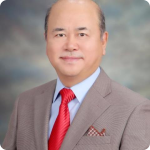
Lecture: Taiwan's Response and the Roles of Neighboring Countries (South Korea, Japan) to the Cross-Strait Crisis
- 2:30 pm to 4:00 pm
- Posvar Hall 4130
As of September 2025, relations between China and Taiwan remain in a state of ‘managed tension’. China has reiterated the ‘One China’ principle, defining Taiwan as an ‘inseparable territory’, and has intensified military and diplomatic pressure on Taiwan independence forces. Since September, the Chinese People's Liberation Army (PLA) has continuously violated Taiwan's Air Defense Identification Zone (ADIZ), employing ‘gray zone’ tactics. The pace of air incursions, exceeding 300 per month as of August, has been sustained into September.
Ph.D. CHO HYEON GYU is a retired colonel and is currently a professor and Dean of international affairs of Shinhan University, the head of the China Center of the Korea Defense Diplomatic Association, and a policy advisor to the Ministry of National Defense. He is a recipient of the Order of Merit for National Security. He served as a visiting professor at Fu Dan University in China. He majored in Chinese at the Korea Military Academy and the Hankuk University of Foreign Studies, holds a master's degree in international politics and complete a doctorate at Renmin University of China. He earned a doctorate in international politics from Dankook University(Dissertation topic : “A Study on the China's Military Reform in the Xi Jin Ping Era”).
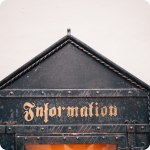
Information Session: Vira I. Heinz Program Information Session
- 3:00 pm to 4:00 pm
- 810 William Pitt Union
Want to study abroad this summer? You could be selected for a scholarship of $5,000+! Learn more about the Vira I. Heinz Program for Women in Global Leadership (VIH Program) by stopping by this info session. Qualified students will be female-identifying, have a QPA of 3.0 and be a current sophomore or junior with no prior travel experience beyond Canada. Come by even if you are thinking about it for next year!

Teacher Training--Area Studies: Interdisciplinary Strategies for Teaching Traditional Cultural Heritage
- Iryna Voloshyna
- 6:30 pm to 8:00 pm
This webinar will concentrate on UNESCO-recommended methodological strategies of including topics on traditional cultural heritage of Eastern Europe and Eurasia into the curricula, for courses spanning from language, arts, and geography, to mathematics and physics. Educators will come away with resources and strategies for integrating these themes into a variety of classroom settings.
This webinar is the first in a six-part webinar series, The Arts of Eastern Europe and Eurasia, designed to support K-14 educators in bringing the vibrant and diverse artistic traditions of Russia, Eastern Europe, and Eurasia into the classroom. Each 90-minute session will spotlight a different art form—including music, dance, literature, visual arts, cultural artifacts, and theater/film—offering both historical and cultural context as well as practical classroom strategies.
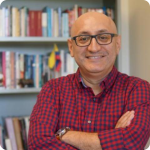
Lecture: CLAS Speaker Series: Mapping Bogota: Memory, Space and Urban Imagination
- Dr. Álvaro A. Bernal
- 1:00 pm
- Zoom
Dr. Álvaro A. Bernal is a professor in the Foreign Language Department at UPJ, where he has served as a faculty member since 2006. He holds a PhD in Spanish from the University of Iowa, a Master’s degree in English Literature from Governors State University, a Master’s degree in Latin American Literature from the University of Northern Iowa, and a Master’s degree in Creative Writing in Spanish from Universidad Internacional de la Rioja, Spain.
Dr. Bernal is the author of two theoretical books on Bogotá:
· Percepciones e imágenes de Bogotá: Expresiones literarias urbanas (2010; second edition 2018)
· Bogotá: Realidades, delirios y ficciones (2016)
He has also published over 20 refereed articles focusing on Latin American literature and culture. Beyond his scholarly work, Dr. Bernal is passionate about fostering a global perspective among his students. He actively encourages participation in study abroad programs and engagement with the Spanish Club to deepen students’ understanding and appreciation of Hispanic language and culture.
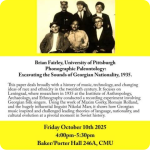
Seminar: Phonographic Paleontology: Excavating the Sounds of Georgian Nationality, 1935
- Brian Fairley (UCIS/REEES Postdoctoral Fellow)
- 4:00 pm to 5:30 pm
- Baker Hall 246A, Carnegie Mellon University
This paper deals broadly with a history of music, technology, and changing ideas of race and ethnicity in the twentieth century. It focuses on Leningrad, where researchers in 1935 at the Institute of Anthropology, Archaeology, and Ethnography conducted recording experiments involving Georgian folk singers. Using the work of Maxim Gorky, Romain Rolland, and the hugely inflectional linguist Nikolai Marr, it shows how Georgian music inspired and challenged leading theories of language, nationality, and cultural evolution at a pivotal moment in Soviet history. Part of the Socialist Studies Seminar series.
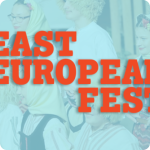
Festival: East European Festival
- 12:00 pm
- Cathedral of Learning Commons Room
Don’t have a chance to travel during fall break? Join us to experience hospitality of the cultures of Eastern Europe and its surrounding regions through food, music and educational information! This event will bring together Pitt student organizations & academic units, the Nationality & Heritage Room committees, and other community members to learn about and celebrate the rich East European cultural history of the Pittsburgh region. The first 100 Pitt students with a Pitt ID can get a free treat from Jak’s Bakery and Steel City Chimneys!
Co-Sponsors: NRIEP, Slavic Department, Summer Language Institute, Bosnian, Croatian, Serbian, Montenegrin Program; Hungarian Language Program; Modern Greek Language Program; Polish Language Program; Russian Language Program; Slovak Language Program; BCMS Club; Polish Culture Club; Russian Club; Slovak Club; Ukrainian Club; Pitt GEO; REEES; GOSECA
Nationality and Heritage Room Committees: Czechoslovak, Hungarian, Romanian, and Yugoslav

Festival: Polishfest: Poland and its Neighbors Welcome You!
- 12:00 pm to 4:00 pm
- Cathedral of Learning Commons Room
Polishfest: Poland and its Neighbors Welcome You is designed to give everyone an opportunity to experience the living Polish, Lithuanian, Hungarian, and Carpatho-Rusyn and other cultures in the regions. These cultures represent peoples that throughout history were joined, separated and independently are connected. A living legacy presented to teach, to experience, to taste, to try and to have fun. This family-oriented event is FREE to everyone and will include many activities such as Polish name writing; Lithuanian angel papercutting demonstration; pierogi / pirohy cooking demonstrations and samples; and Carpatho-Rusyn spinning and lace making; and a pierogi toss. Every display, demonstration, and activity will offer an explanation of the cultural history of the tradition.
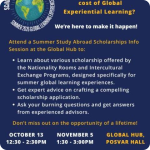
Information Session: Scholarship Info Sessions: Summer 2026 Global Learning Experiences
- 12:30 pm
Explore the world with funding support from the Nationality Rooms and Intercultural Exchange Programs Scholarships. The NRIEP funding support will enable you to achieve your summer global learning experience. The NRIEP Scholarship Program is nearly sixty years old and supports study abroad, internships, independent research and experiential learning for Pitt students around the world.
What you will gain from this information session:
Scholarship Insights: Learn about various scholarships designed specifically for summer global experience programs.
Application Tips: Get expert advice on crafting a compelling scholarship application.
Your global adventure begins here!
Dates:
October 13th 2025, 12:30PM and November 5th, 1:30PM
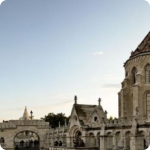
Language Table: Hungarian Conversation and Tutoring
- Viktoria Batista
- 4:00 pm to 5:00 pm
- Braun Room (12th Floor), Cathedral of Learning
Tuesdays, 4-5pm
Braun Room (12th Floor), Cathedral of Learning
Come to chat, practice, meet others who are interested in Hungarian and Hungary! All levels are welcome.
For more info, contact Dr. Viktoria Batista (vib21@pitt.edu)
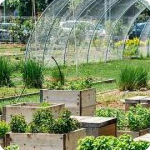
Information Session: Urban Farm Tours
- 9:00 am to 4:00 pm
- Various
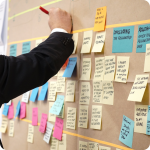
Workshop: Faculty Roundtable: Displacing Territory
- Drs. Karen Culcasi, Michael Glass and Robert Ross
- 1:00 pm
- 4130 WWPH
Displacement disrupts our understandings of borders, identity, and home. We invite you to a dynamic, faculty-led roundtable that explores the pressing and complex themes of displacement, territoriality, and belonging through a multidisciplinary lens. Drawing on the lived experiences of Palestinian and Syrian refugees in Jordan, this discussion will delve into how these realities challenge traditional frameworks and open new avenues for research and teaching.
Together, we’ll critically examine the varied roles and responsibilities of the Global North and South in addressing the ongoing refugee crisis. The roundtable will also spotlight a range of innovative research methodologies for engaging with transnational, interdisciplinary issues.
Faculty participants will receive a complimentary copy of Displacing Territory: Syrian and Palestinian Refugees in Jordan.
Register Here:https://docs.google.com/forms/d/e/1FAIpQLSfqum4WVIt0eVH8PjsM9RYc0ztFJyMg...

Lecture: The Green Scene: Urban Farmers, Sustainable Communities in Pittsburgh and Berlin
- Dr. Jesko Hirschfeld, Humboldt University of Berlin
- 5:00 pm to 6:00 pm
- 4130 Posvar Hall
This event is part of a two-day series focusing on sustainability in Europe and Pittsburgh.
About the Keynote Speaker:
Jesko Hirschfeld studied economics at the universities of Bonn, Frankfurt am Main, and the Free University of Berlin. From 1996 to 1998, he worked as a scientific staff member for the German Federal Parliament (Bundestag), and from 1998 to 2002, he worked on his doctorate with a scholarship by the German Research Foundation (DFG) in the Research Training Group “Agriculture and Environment” at the University of Göttingen. Since 2002, he has been a research associate and later subject area manager for water and land management at the Institute for Ecological Economy Research (IÖW) in Berlin in the research field “Environmental Economics and Policy.” From 2017 to 2020, in addition to his work at the IÖW, he was a visiting professor for landscape economics at the Technical University of Berlin. From 2022 to 2024, he taught as a visiting professor of environmental economics at Humboldt University in Berlin. He has worked on numerous inter- and transdisciplinary projects on natural climate protection, nature-based adaptation to climate change, land and water use, and integrated coastal zone management, focusing primarily on economic aspects and ecological-economic assessments. In recent years, he has focused on urban ecosystem services provided by urban green spaces, parks, and gardens.
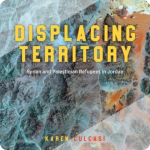
Teacher Training: Displacing Territory: K-12 Educator PD Workshop
- Dr. Karen Culcasi, Michael-Ann Cerniglia
- 6:00 pm to 7:30 pm
- 4130 Posvar Hall and via Zoom
Join the Global Studies Center on Wednesday, October 15 from 6:00-7:30 PM ET in 4130 or via Zoom for a presentation by Dr. Karen Culcasi on her book, Displacing Territory: Syrian and Palestinian Refugees in Jordan. Curriculum strategies and resources for K-12 classroom use will also be shared. A limited number of books will be mailed to registrants in advance of the workshop.
Language Table: Turkish Language Table
- Eda Kurtsoy
- 8:00 pm to 9:00 pm
- Global Hub
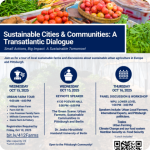
Workshop: Sustainable Cities & Communities: A Transatlantic Dialogue
- Various
- 1:00 pm to 3:00 pm
- WPU, Lower Lounge
Final Event of this two-day event
Part I: Panel Discussion
Moderator: Randall Halle, European Studies Center
Panelists:
Dr. Patrick Shirey — Geology and Environmental Science, University of Pittsburgh
Lisa Freeman — Freeman and Family Farm
State Representative Emily Kinkead, PA House District 20, Chair of the Legislative Hunger Caucus
Dr. Jesko Hirschfeld — Humboldt University of Berlin
Part II: Breakout / Discussion Groups
Group A: Urban Farming Challenges and Opportunities
Group B: Climate resilience strategies in cities
Group C: Ensuring nutrition security for vulnerable populations
**Lunch will be provided

Information Session: Vira I. Heinz Program Information Session
- 4:00 pm to 5:00 pm
- 810 William Pitt Union
Want to study abroad this summer? You could be selected for a scholarship of $5,000+! Learn more about the Vira I. Heinz Program for Women in Global Leadership (VIH Program) by stopping by this info session. Qualified students will be female-identifying, have a QPA of 3.0 and be a current sophomore or junior with no prior travel experience beyond Canada. Come by even if you are thinking about it for next year!
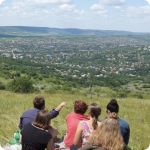
Information Session: American Councils Info Session
- 1:00 pm to 2:30 pm
- Global Hub, Posvar Hub
Interested in studying, researching, or teaching abroad? Join American Councils for International Education to learn about opportunities across Eurasia, East Asia, and beyond. Programs emphasize advanced language study, area expertise, and cultural immersion.
Opportunities for faculty and undergraduate & graduate students:
- Explore summer, semester, and year-long options
- Learn about fellowship, scholarship, and financial aid opportunities
- Connect programs to UCIS global and area studies
Discover how you can build language skills, expand research, and engage globally with the support of Pitt's University Center for International Studies and American Councils.
- 1 of 4
- next ›



